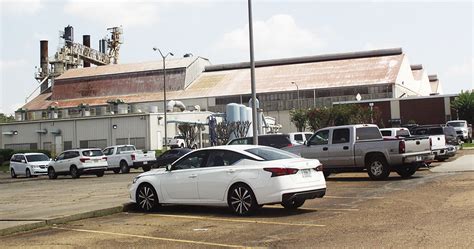
An abrupt announcement that Sabreliner Aviation in Perryville, Illinois, would shutter its doors by the end of December has left approximately 300 employees jobless and the local community reeling. The sudden closure, revealed on Monday, blindsided workers and city officials alike, raising concerns about the economic impact on the small town.
Sabreliner Aviation, a maintenance, repair, and overhaul (MRO) facility specializing in aircraft services, cited unforeseen economic circumstances as the primary driver behind the decision. “We regret to announce the closure of our Perryville, Illinois facility effective December 29, 2023,” the company stated in a brief press release. “This was a difficult decision, made after careful consideration of the current economic climate and its impact on our business.” The announcement offered little solace to the hundreds of employees who now face an uncertain future during the holiday season.
The news spread quickly through Perryville (population approximately 8,000), a tight-knit community where Sabreliner Aviation has been a significant employer for several years. Mayor Ken Baer expressed his shock and disappointment at the closure. “This came as a complete surprise,” Baer said. “We had no indication that the company was facing such severe challenges. This is a devastating blow to our community.”
Workers leaving the facility on Monday were visibly upset, with many expressing anger and frustration over the lack of warning. “We were just told this morning. No advance notice, nothing. Just pack your things and leave,” said one employee who wished to remain anonymous. “How are we supposed to find new jobs right before Christmas?”
The closure of Sabreliner Aviation underscores the volatile nature of the aviation industry and the vulnerability of small towns dependent on single major employers. The economic repercussions are expected to be significant, affecting not only the displaced workers and their families but also local businesses that relied on the company’s presence.
Economic Impact and Community Reaction
Perryville, situated in rural southern Illinois, has historically relied on manufacturing and agriculture for its economic stability. The presence of Sabreliner Aviation offered a diversification of the local economy and provided relatively high-paying jobs, attracting skilled workers to the area. The loss of these jobs is expected to have a ripple effect throughout the community, impacting housing, retail, and other service sectors.
“The impact will be felt across the board,” said local economist Dr. Emily Carter. “These are not just 300 jobs; these are 300 families who will now have less disposable income. Local businesses will see a decline in revenue, and the overall economic health of Perryville will suffer.”
The city government is scrambling to assess the full extent of the economic damage and to explore potential avenues for mitigating the impact. Mayor Baer has pledged to work with state and federal agencies to provide assistance to the displaced workers and to attract new businesses to the area. “We are committed to doing everything we can to support our residents during this difficult time,” Baer said. “We will be reaching out to state and federal officials to explore all available resources and opportunities.”
The immediate concern is providing support to the affected workers. The Illinois Department of Employment Security (IDES) has announced that it will be holding a series of workshops in Perryville to assist workers with filing for unemployment benefits, resume writing, and job searching. Local community organizations are also stepping up to provide food assistance, financial counseling, and other support services.
“We understand that this is a challenging time for many families in Perryville,” said Sarah Johnson, director of the Perryville Community Action Agency. “We are here to provide assistance and support to those who need it. We want to ensure that everyone has access to the resources they need to get back on their feet.”
Sabreliner Aviation’s Perspective and History
Sabreliner Aviation, while not a household name, has a long and storied history in the aviation industry. Originally founded in the 1950s as a division of North American Aviation (later Rockwell International), the company initially focused on the design and production of business jets, including the Sabreliner series, which gained popularity among corporate executives and government officials.
Over the years, Sabreliner Aviation transitioned from manufacturing to providing maintenance, repair, and overhaul (MRO) services for a wide range of aircraft. The Perryville facility specialized in servicing regional jets and corporate aircraft, offering services such as airframe maintenance, engine repair, avionics upgrades, and paint refurbishment.
The company’s statement regarding the closure attributed the decision to “the current economic climate and its impact on our business.” However, details surrounding the specific financial challenges faced by Sabreliner Aviation remain scarce. Industry analysts suggest that several factors may have contributed to the company’s difficulties, including increased competition in the MRO market, rising labor costs, and a slowdown in demand for aircraft maintenance services.
“The MRO industry is becoming increasingly competitive,” said aviation analyst John Thompson. “Companies are facing pressure to reduce costs and improve efficiency. Sabreliner Aviation may have struggled to keep pace with these changes, particularly in a smaller market like Perryville.”
The closure of the Perryville facility raises questions about the future of Sabreliner Aviation as a whole. The company has other facilities in different states; however, the Perryville plant was a significant part of its operations. It remains unclear whether the company plans to consolidate its operations or make further cuts in response to the economic challenges it is facing.
Political and Regulatory Implications
The sudden closure of Sabreliner Aviation has also drawn the attention of state and federal lawmakers. Illinois Governor JB Pritzker has expressed his concern about the situation and pledged to provide assistance to the affected workers and the Perryville community.
“My administration is committed to supporting the workers and families affected by the closure of Sabreliner Aviation in Perryville,” Pritzker said in a statement. “We will work closely with local officials and community organizations to provide resources and assistance to those who need it.”
U.S. Senator Dick Durbin and U.S. Representative Mike Bost, who represents the district where Perryville is located, have also weighed in on the situation. Both lawmakers have called for a thorough investigation into the circumstances surrounding the closure and have pledged to work to ensure that the affected workers receive the benefits and support they are entitled to.
“I am deeply concerned about the closure of Sabreliner Aviation in Perryville and the impact it will have on the community,” Durbin said. “I will work with my colleagues in Congress to ensure that the affected workers receive the unemployment benefits, job training, and other assistance they need to get back on their feet.”
Representative Bost added, “This is a devastating blow to the Perryville community. I will be working with state and local officials to explore all possible options for mitigating the impact of this closure and for attracting new businesses to the area.”
The closure of Sabreliner Aviation also raises questions about the role of government in supporting businesses and protecting workers. Some critics argue that the government should have done more to prevent the closure, while others contend that the company’s financial difficulties were beyond the government’s control.
“This situation highlights the need for a more proactive approach to economic development,” said state Representative Katie Stuart. “We need to invest in our communities and create an environment that is conducive to business growth and job creation.”
The Future of Perryville
The closure of Sabreliner Aviation presents a significant challenge for the Perryville community, but it also offers an opportunity for renewal and diversification. The city government is already exploring potential strategies for attracting new businesses to the area and for developing new industries.
One potential avenue for economic development is tourism. Perryville is located in a scenic area of southern Illinois, with several state parks and recreational areas nearby. The city could capitalize on its natural beauty by promoting tourism and attracting visitors to the area.
Another potential strategy is to focus on developing new industries, such as renewable energy or advanced manufacturing. The city could partner with local colleges and universities to provide training and education programs that would prepare residents for jobs in these emerging industries.
“We need to be proactive and creative in our approach to economic development,” said Mayor Baer. “We cannot rely on a single employer to sustain our community. We need to diversify our economy and create new opportunities for our residents.”
The road ahead will be challenging, but the residents of Perryville are resilient and determined to overcome this setback. With the support of state and federal agencies, community organizations, and local businesses, Perryville can emerge from this crisis stronger and more vibrant than ever before. The spirit of the community, known for its hard work and dedication, remains unbroken, and that spirit will be crucial in navigating the difficult times ahead. The focus now is on providing immediate assistance to the displaced workers and their families, while simultaneously laying the groundwork for a more diverse and sustainable economy in the future.
Frequently Asked Questions (FAQ)
Q1: Why did Sabreliner Aviation close its Perryville, Illinois, plant?
A1: Sabreliner Aviation cited unforeseen economic circumstances and the impact of the current economic climate on its business as the primary reasons for the closure. The company stated that the decision was made after careful consideration of the financial challenges it was facing. However, specific details regarding the exact nature of these challenges have not been publicly disclosed. Industry analysts suggest increased competition, rising labor costs, and a slowdown in demand for aircraft maintenance services could have contributed to the situation.
Q2: How many employees are affected by the plant closure?
A2: Approximately 300 employees are affected by the closure of the Sabreliner Aviation plant in Perryville, Illinois. These employees are now facing joblessness right before the holiday season, adding to the stress and uncertainty surrounding the situation.
Q3: What kind of assistance is being offered to the displaced workers?
A3: Several forms of assistance are being offered to the displaced workers, including:
- Unemployment Benefits: The Illinois Department of Employment Security (IDES) is holding workshops to assist workers with filing for unemployment benefits.
- Job Search Assistance: IDES is also providing assistance with resume writing and job searching.
- Financial Counseling: Local community organizations are offering financial counseling services to help workers manage their finances during this difficult time.
- Food Assistance: Community organizations are also providing food assistance to families in need.
- State and Federal Support: State and federal lawmakers have pledged to work to ensure that the affected workers receive the benefits and support they are entitled to.
Q4: What is the expected economic impact of the plant closure on Perryville?
A4: The closure of Sabreliner Aviation is expected to have a significant negative impact on the Perryville community. The loss of 300 jobs will reduce the disposable income of local families, leading to a decline in revenue for local businesses. The overall economic health of Perryville is expected to suffer as a result. The ripple effect could extend to housing, retail, and other service sectors, potentially leading to further job losses and economic hardship.
Q5: What is the city of Perryville doing to address the economic impact of the closure?
A5: The city of Perryville is taking several steps to address the economic impact of the Sabreliner Aviation plant closure, including:
- Seeking State and Federal Assistance: Mayor Ken Baer has pledged to work with state and federal agencies to explore all available resources and opportunities to support the community.
- Attracting New Businesses: The city is actively working to attract new businesses to the area to diversify the local economy and create new jobs.
- Developing New Industries: Perryville is exploring potential strategies for developing new industries, such as tourism, renewable energy, and advanced manufacturing.
- Supporting Displaced Workers: The city is working with local community organizations to provide support and assistance to the displaced workers and their families. The long-term goal is to create a more resilient and diversified economy that is less vulnerable to the loss of a single major employer.
Expanded Context and Analysis
The Sabreliner Aviation closure is symptomatic of broader trends affecting manufacturing and service-based economies in smaller, rural communities across the United States. Globalization, technological advancements, and shifting market demands are all contributing to increased competition and economic instability.
Globalization and Competition: The rise of global competition has made it more difficult for companies in the United States to compete on price and quality. Companies in countries with lower labor costs and less stringent regulations often have a competitive advantage. This has led to the outsourcing of jobs and the closure of factories in the United States.
Technological Advancements: Technological advancements, such as automation and artificial intelligence, are also displacing workers in manufacturing and service industries. As companies invest in new technologies to improve efficiency and reduce costs, they often require fewer employees.
Shifting Market Demands: Changes in consumer preferences and market demands are also affecting businesses. Companies that fail to adapt to these changes risk losing market share and eventually going out of business. In the aviation industry, the demand for MRO services is constantly evolving, requiring companies to invest in new technologies and training to stay competitive.
The Vulnerability of Small Towns: Small towns that rely on a single major employer are particularly vulnerable to economic shocks. When a major employer closes its doors, it can have a devastating impact on the local economy, leading to job losses, business closures, and a decline in property values. The Sabreliner Aviation closure in Perryville is a prime example of this phenomenon.
Strategies for Economic Resilience: To build economic resilience, small towns need to diversify their economies and create new opportunities for their residents. This can involve attracting new businesses, developing new industries, investing in education and training, and improving infrastructure.
Investing in Education and Training: Investing in education and training is essential for preparing residents for the jobs of the future. This includes providing access to vocational training, apprenticeships, and higher education. It also means promoting lifelong learning and skills development.
Improving Infrastructure: Investing in infrastructure, such as roads, bridges, and broadband internet, is crucial for attracting businesses and supporting economic growth. Good infrastructure makes it easier for companies to transport goods and services and for residents to access information and opportunities.
Community Collaboration: Successful economic development requires collaboration between government, businesses, community organizations, and residents. By working together, these stakeholders can identify local needs and opportunities and develop strategies for building a stronger and more resilient economy.
The Human Cost: While economic statistics and policy discussions are important, it is crucial to remember the human cost of plant closures and job losses. The employees of Sabreliner Aviation in Perryville are not just numbers on a spreadsheet; they are individuals with families, hopes, and dreams. The loss of their jobs will have a profound impact on their lives and the lives of their loved ones. Providing support and assistance to these workers is not only the right thing to do, but it is also essential for the long-term health and well-being of the Perryville community.
The Sabreliner Aviation closure serves as a stark reminder of the challenges facing many small towns in the United States. It also underscores the importance of proactive economic development strategies, community collaboration, and a commitment to supporting workers and families during times of economic hardship. The future of Perryville depends on its ability to adapt, innovate, and build a more diverse and resilient economy. The immediate focus remains on providing a safety net for those affected, but the long-term vision must be one of sustainable growth and opportunity for all residents.









